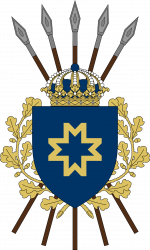Coat of arms of Sedunn (Pacifica)
| Coat of arms of Sedunn | |
|---|---|
 | |
| Versions | |
 The lesser coat of arms of Sedunn for non-government-exclusive use | |
| Armiger | Kingdom of Sedunn |
| Adopted | 650 - 550 BCE 1853 CE (current design) |
| Crest | Sedunnic Crown |
| Blazon | Azure, the Star of Limmvasd Or |
| Supporters | Behind the shield, five spears tenné, one in pale and four in saltire Argent and thereon two oak branches embowed Or. |
| Use | Greater: on treaties, official government documents and buildings. Lesser: official state and agency documents and buildings, embassies, passports, identity cards, driving licences, currency |
The coat of arms of the Kingdom of Sedunn (Sedunic: Devtoved Sedunnō karlhinnib) has a lesser and a greater version. The lesser version features the Star of Limmvasd on a traditional Im knight's shield and a crown, and is used by the Sedunnic state and its authorities and agencies. The greater version additionally features the five Brother Spears and oak branches, and may only be used by the Sedunnic government. The shield and the spears represent actual equipment of the personal guard of the first Sedunnic monarchs. Even though the main elements of the Sedunnic coat of arms are as old as the kingdom itself, the current version was officially adopted in 1853.
Description
The main features of the Sedunnic coat of arms consists of a blue shield in official Sedunnic blue with the Star of Limmvasd in yellow. On top there is the people's crown. These comprise the lesser coat of arms. The greater coat of arms also features the five Brother Spears in brown and silver, and two golden oak branches the almost encircles the shield. The current design was adopted by passing the National Symbols Law in July 12, 1853, confirming the much older blazon and defining specific colour shades. For the shield the blazon is as follows:
Azure, the Star of Limmvasd Or.
And for the supporters:
Five spears tenné, one in pale and four in saltire Argent and thereon two oak branches embowed Or.